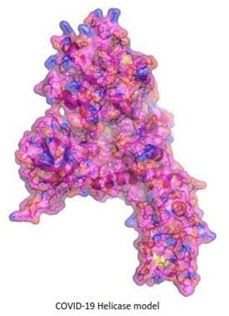Impact BioMedical, has conducted molecular docking studies through its scientific research partner GRDG Sciences utilising advanced computational models, indicating that its Linebacker and Equivir compounds successfully inhibit infection by SARS-CoV-2, the virus responsible for the COVID-19 outbreak.
The results indicate that the two compounds block 3 integral viral mechanisms for SARS-CoV-2 replication and infection: the viral spike interaction point, helicase, and protease.
Equivir and Linebacker are undergoing accelerated testing against the SARS-CoV-2 virus and data is expected to confirm efficacy based on previous work against other coronaviruses such as SARS and MERS.
This research is part of a programme conducted by GRDG to adhere to the principles and initiatives established by Project Bioshield and the Biomedical Advanced Research and Development Authority (BARDA) directives from the US Department of Health and Human Services (HHS).
On 11 March 2020, the WHO Director-General, Dr Tedros Adhanom Ghebreyesus stated that there are more than 118,000 cases of COVID-19 in 114 countries and 4,291 people have lost their lives. The WHO has therefore made the assessment that COVID-19 can be characterised as a pandemic and this is the first pandemic caused by a coronavirus.
Mechanism
"Recent studies and analyses indicate that Angiotensin-converting enzyme 2 ("ACE2") could be the host receptor for the novel coronavirus 2019-nCoV/SARS-CoV-2," says Dr David Ostrov, a structural biologist/immunologist at the University of Florida. Ostrov previously discovered compounds that bind to ACE2, blocking interactions with SARS.
"These new compounds with the potential to bind ACE2 and block coronavirus entry into cells were identified by simulation of structural interactions. New drug candidates will be evaluated for effects on coronavirus with GRDG,” Ostrov explained.

Identifying ACE2 as the host receptor for SARS-CoV-2 is significant, however, inhibiting ACE2 is problematic as ACE2 is required to regulate the cardiovascular system. Therefore, the intention is to modulate ACE2 through a conformational change to prevent interaction with the virus while simultaneously inhibiting the helicase and protease sites of the ACE2 which are necessary for viral replication.
The research is headed by Daryl Thompson, GRDG's Director of Scientific Initiatives.
"The coronavirus presents a unique challenge in that it appears to exploit a 'handshake' docking site to human cellular membranes that is atypical of Influenza and Rhinovirus,” Thompson said. “Influenza attaches to human membranes through the use of ICAM or intercellular adhesion molecules to download its genetic material.”
Thompson further explained that it's now becoming clear that the present strain of coronavirus is hijacking the ACE2 or Angiotensin-Converting Enzyme pathway to accomplish the same goal. The issue is that ACE2 is essential for maintaining the health of the pulmonary system and may not be a straightforward target for inhibition. “Instead, we are utilising both Linebacker and Equivir therapeutics as molecular probes to identify methods to make the ACE2 resistant and less accessible to coronavirus infection," Thompson said.
Impact BioMedical is a subsidiary of Singapore eDevelopment.
